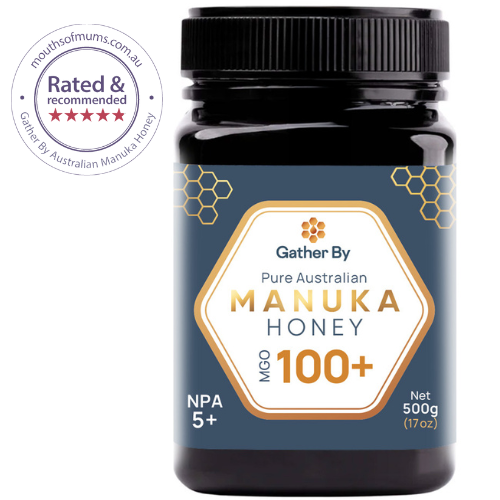
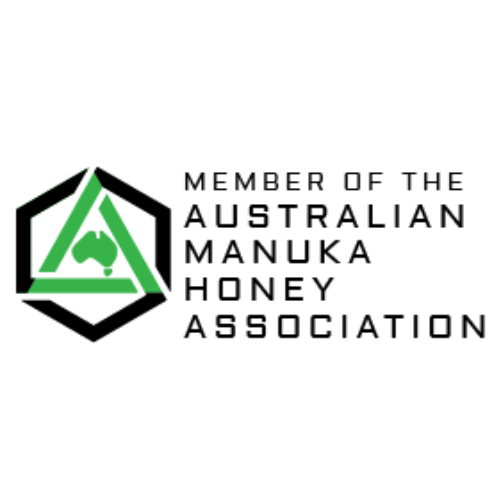
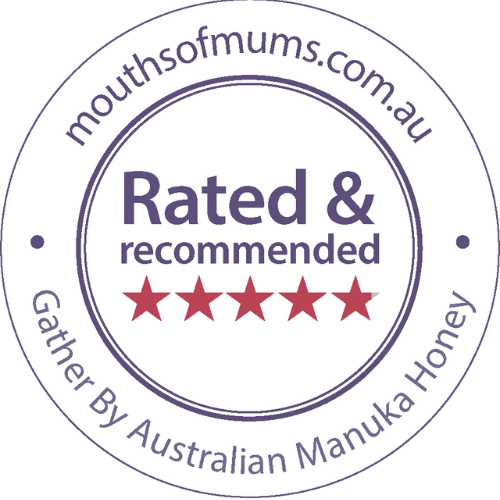
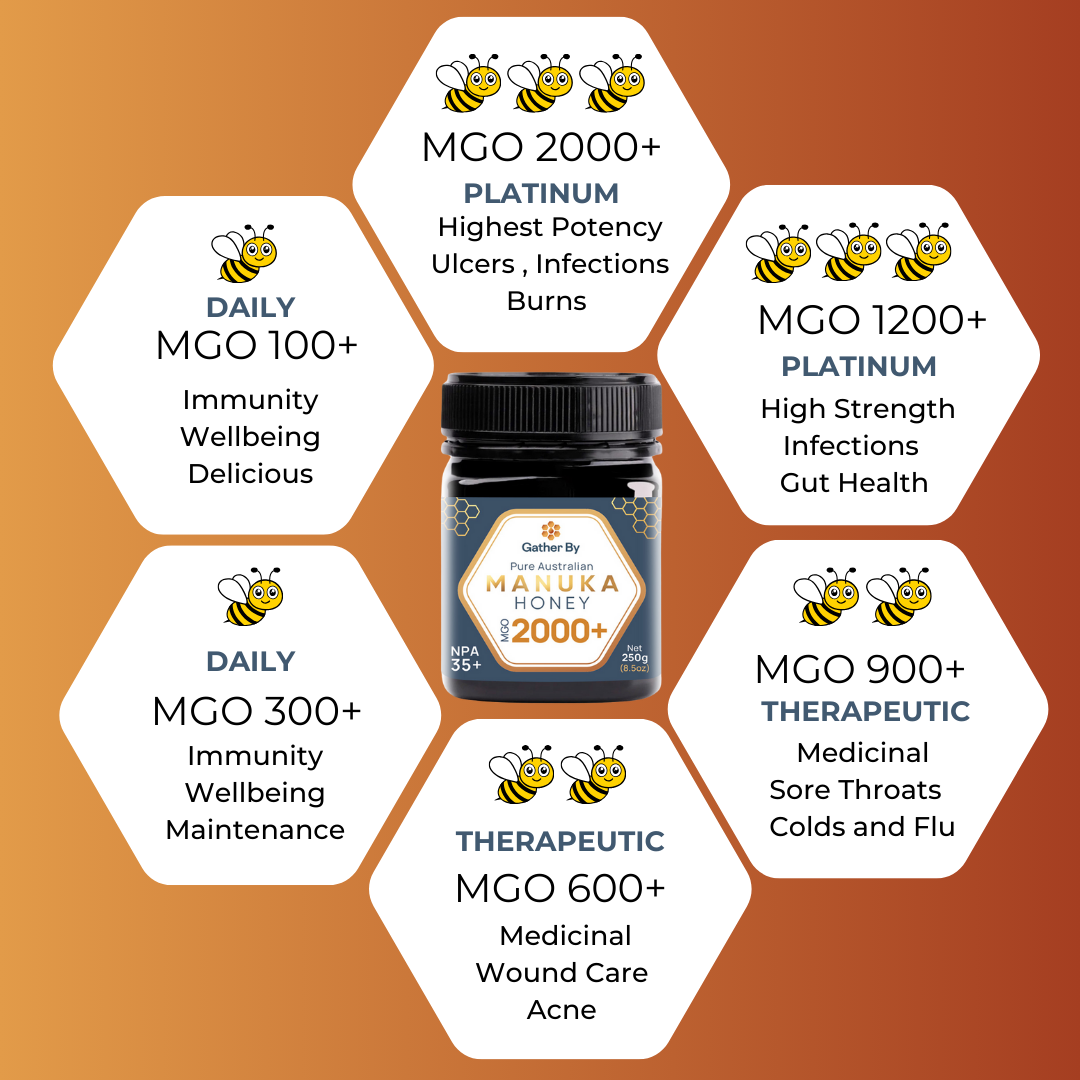
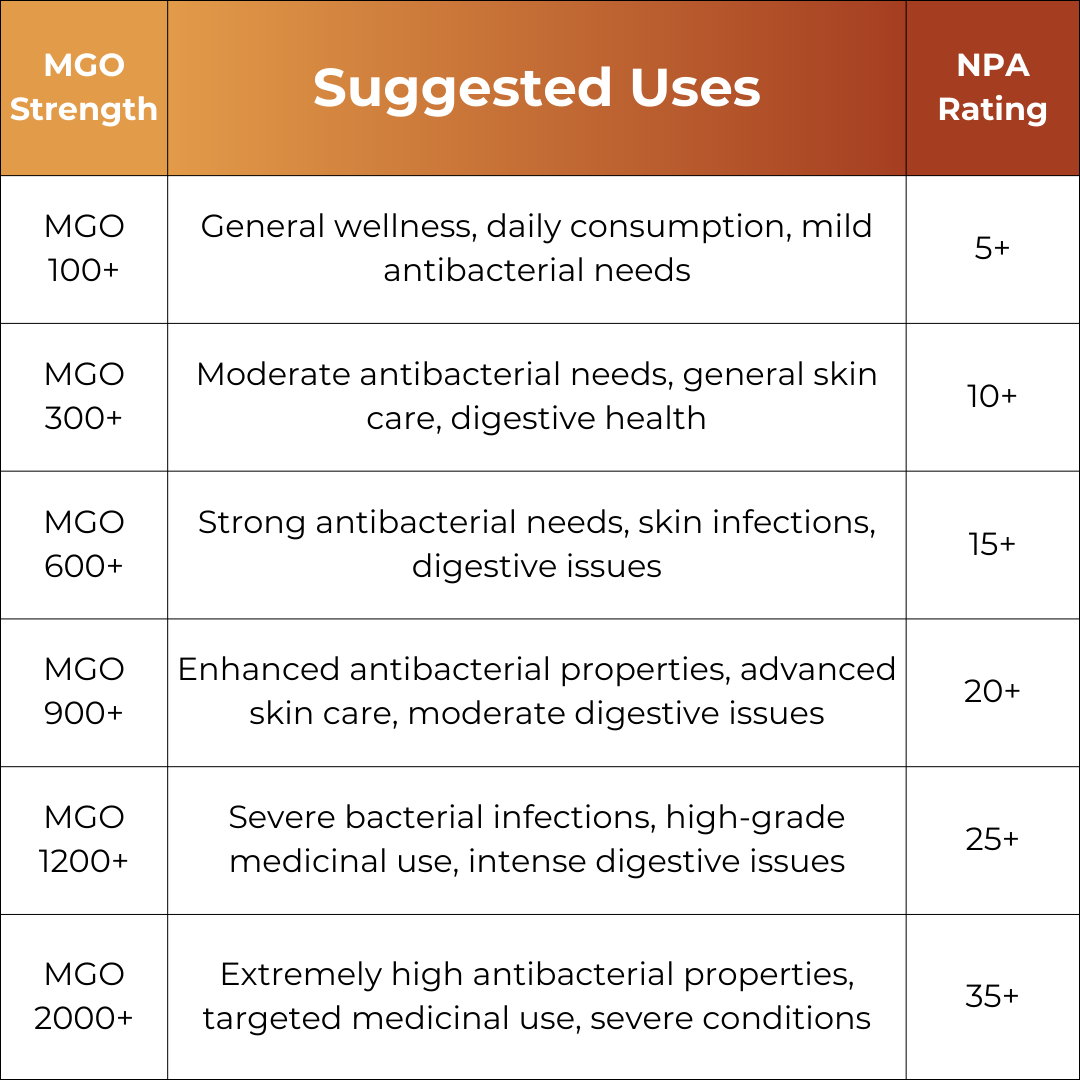
Manuka Honey MGO 100+ | NPA 5+
Ritiro disponibile presso la sede Gather By Australia - 1/200 Southern Cross Drive
Di solito pronto in 2 ore

Manuka Honey MGO 100+ | NPA 5+
500g
Gather By Australia - 1/200 Southern Cross Drive
1/200 Southern Cross Drive
Ballina NSW 2478
Australia
MGO100+ — Good MGO Strength (Daily Range) 500g
MGO Explained
Methyglyoxal (MGO)
MGO strength refers to the independently lab-verified methylglyoxal (mg/kg) in our Manuka honey. Higher MGO is associated with stronger antibacterial activity.
What it is, and why it matters
MGO100+ is the easiest entry into authentic Australian Manuka Honey. Manuka nectar is naturally rich in DHA (dihydroxyacetone), which slowly converts to MGO (methylglyoxal) as the honey matures. We store every batch under controlled temperatures, then release it when the DHA:MGO balance delivers great flavour and a reliably lab-verified MGO level. Research shows that the more MGO a Manuka honey contains, the stronger its non-peroxide (NPA) antibacterial activity when used or consumed.
What the ‘+’ means
The + is a minimum. MGO100+ means the honey contains at least 100 mg/kg of methylglyoxal. Batches typically test 5% or more above that figure.
How to Use
Stir into cooled tea with lemon, drizzle over yoghurt or granola, sweeten smoothies and breakfast bowls, or spread lightly on toast and crumpets. It’s also great for baking when you want a subtle Manuka accent without dominating other flavours.
Who chooses 100+
Manuka buyers who want sweetness with goodness, everyday versatility, trusted provenance, and transparent testing without stepping into premium pricing.
Taste & Aroma
Light-to-medium amber colour, gentle flavour notes, and a clean finish with a recognisable Manuka character.
Provenance & Guarantees
Australian Manuka
Gather By honey is sourced from healthy honeybees foraging on biodiverse Australian Leptospermum plants, grown in partnership with Australian farmers and Traditional Owners to produce naturally pure, raw and potent Manuka honey.
Authenticity & assurance
Every jar is independently MGO-tested, track-and-trace enabled, and packed in Ballina, NSW under HACCP/B-QUAL systems. We’re an award-winning Australian producer, and a COA is available on request.
Each batch independently tested & verified
Australian researchers from University of Sunshine Coast (USC) including teams studying the chemistry of Leptospermum honeys have mapped markers that help authenticate and profile Manuka. The USC provides independently verified evidence of each batch of honey that is released to the public.
AMHA Mark of Authenticity — why it matters
Gather By is a founding member of the Australian Manuka Honey Association (AMHA). This Mark of Authenticity means the honey was produced in Australia from Leptospermum, and independently tested by an approved lab for the key markers of authentic Australian Manuka. The Mark also requires traceability through the supply chain. In short: it’s your quick way to trust what’s in the jar and to compare strength by a verified MGO number.
Storing Honey & Crystallisation
All our honey is dispatched from our warehouse runny and fresh, however, crystallisation can happen eventually to pure and raw honey.
There are things you can do to prevent or prolong this process though, which includes storing the honey out of direct sunlight, between 10 - 22°C, and keeping the lid tight to avoid moisture getting in.
Because we avoid excessive heat, some jars may crystallise naturally over time. Many customers love the creamy texture; if you prefer it runny, stand the jar in warm (not hot) water and stir gently.
Health in Research
Manuka honey has been studied for decades across laboratory, clinical, and health-system settings.
These describe the research landscape on honey/Manuka across each area.
Wound & skin care (medical-grade dressings)
- Big evidence reviews find that honey dressings can speed healing for partial-thickness burns and some infected post-op wounds. Cochrane+1
- UK summaries on advanced/antimicrobial dressings (includes honey) discuss where they may fit in chronic wound care. NICE+1
Sore throat & cough (URTI self-care)
- UK NICE lists honey as a first-line self-care option for acute cough in people over 1 year, based on trials showing small symptom improvements. NICE
- A BMJ Evidence-Based Medicine meta-analysis reports honey improved URTI symptoms versus usual care; a Cochrane review supports benefit for children’s acute cough. BMJ Evidence-Based Medicine+1
Oral health (plaque/gingivitis)
- A pilot RCT using a chewable Manuka found reductions in plaque and gingival bleeding vs control over 21 days. ハイマート
- A randomised field trial in schoolchildren showed Manuka-based mouthwash reduced plaque and gingival scores Europe PMC
Gut health (prebiotic)
- Dr Patricia L. Conway led an Australian (RIRDC/AgriFutures) report concluding some Australian honeys show prebiotic properties—supporting beneficial gut microbes. AgriFutures Australia
- Conway co-authored overviews highlighting prebiotic potential (lab, animal and early human work) and pathways for future clinical studies. APIMONDIA+1
Immunity (immunomodulation)
- Reviews summarise immunomodulatory and anti-inflammatory effects of honey/bee-product polyphenols; human evidence exists but is heterogeneous and protocol-dependent. MDPI+1
Energy / exercise fueling
- In a randomised crossover cycling trial, honey gel performed similarly to dextrose for a 64-km time-trial. Europe PMC
- Narrative/systematic reviews conclude honey can serve as a viable carbohydrate source in some endurance protocols. ScienceDirect
Strep & MRSA:
- Manuka has lab-demonstrated activity against Streptococcus pyogenes and MRSA, including biofilms. In healthcare, sterile medical-grade honey dressings are used for certain wounds. Europe PMC+2Wounds UK+2
Important Notices
Hospitals use sterile, regulated medical-grade honey dressings supported by clinical evidence and device approvals. Our jars are food: independently MGO-tested and batch-traceable, but not intended to treat diseases or replace medical care.
Important: Not suitable for infants under 12 months
Honey can naturally contain spores of Clostridium botulinum. Infants under 12 months do not yet have mature gut defences to prevent these spores from germinating and producing toxin (infant botulism). Heating or pasteurising honey does not reliably eliminate spores, so please avoid giving honey—or foods containing honey—to babies under one year. From 12 months onward, honey is generally safe for healthy children and adults.
Allergen information
100% Australian Manuka honey (Contains: honey). No added nuts, dairy, gluten, soy or sesame. Honey naturally contains trace pollen and other bee-derived constituents—do not consume if you are allergic to bee products (honey, pollen, propolis, royal jelly). If you have specific allergies or dietary concerns, consult a healthcare professional.
Shipping
We send your Manuka out the day we get your order.
We can express post or use Standard shipping for all orders Domestic and International.
Please choose your preferred option during checkout.
Note: This product is unavailable in New Zealand and Western Australia due to quarantine laws.
Disclaimer
All the material on this website is for information purposes and not intended to be medical advice or replace medical treatment.
The results shared are individual results and may vary. Gather By Manuka honey is sold as a food product. This product is not intended to diagnose, treat, cure, or prevent any disease. Consult your healthcare provider for medical advice.
Scegli le opzioni








